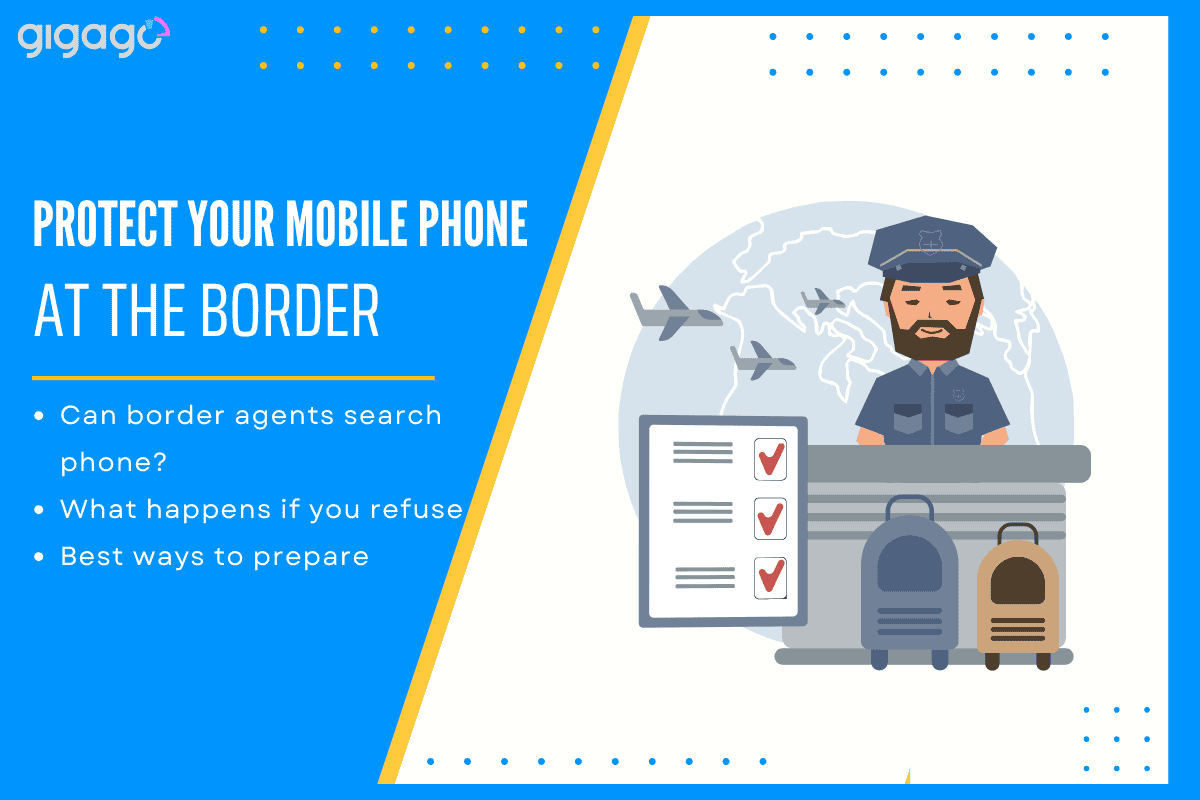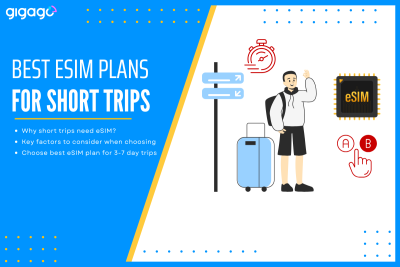A Beijing layover is a great chance to explore, but China’s “Great Firewall” makes staying connected tricky. Without the right plan, you’ll likely find blocked access to essential apps like Google Maps, WhatsApp, and even your banking tools. Whether you have a few hours or a full day, choosing the right connectivity option is key. […]
How to Protect Your Mobile Phone at the Border
Before your next trip, learn how to protect your mobile phone at the border using practical security measures. This guide explains your rights during device searches and outlines specific techniques to safeguard your private data—from proper preparation before travel to managing device security during border crossings—all while maintaining compliance with customs regulations and avoiding travel disruptions.

In this article
I. Can border agents search your phone?
Border agents have significant authority to search for your electronic devices when crossing international borders. Here’s what you need to know:
There are two main types of searches you might encounter:
- Basic searches: Officers manually look through your phone, scrolling through photos, messages, and apps. They don’t use external tools or software to extract data.
- Advanced searches: These involve connecting your device to forensic tools that can copy and analyze your data. In the US, these deeper searches typically require “reasonable suspicion” of illegal activity or a national security concern.
Border agents can only search data physically on your device, not cloud storage. They cannot legally force citizens to unlock devices or deny them entry to their home country for refusing. Knowing these limits helps protect your sensitive information during international travel.
II. What happens if you refuse to unlock your phone?
When border agents request access to your device, your rights and potential consequences differ based on your legal status:
| Status | Can You Refuse? | What Happens? |
| US Citizen | Yes | • Entry allowed (cannot be denied) • Device may be seized for weeks • Additional questioning likely • Delayed processing |
| Non-citizen | No | • Entry can be denied • May be turned away at border • Future visa applications face scrutiny • Device might still be seized |
The legal framework treats citizens differently because countries cannot refuse entry to their own citizens, while entry for non-citizens is considered a privilege that can be denied. Understanding these differences helps you make informed decisions when traveling internationally with sensitive information on your devices.
III. Best ways to prepare your phone before traveling
Border crossings can expose your phone data to searches. Here’s how to protect your privacy without raising suspicion.
Strategic Data Management
1. Delete Sensitive Data (Selectively)
Don’t wipe your entire phone. It looks suspicious. Instead, take a targeted approach:
- Remove specific private messages, photos, and files
- Uninstall sensitive apps (banking, health)
- Empty all “Trash” and “Recently Deleted” folders
2. Moving Private Files to the Cloud
Border agents can’t legally force cloud access in most countries. This creates a simple privacy solution:
Upload important content to iCloud, Google Drive, or Dropbox before traveling. Sign out completely from these services on your device. This keeps sensitive data accessible to you but not to border officials examining your phone.
Device Security Measures
3. Encrypt Your Device
Modern smartphones offer strong encryption to protect your data:
- iPhone: Check Settings → Face ID & Passcode → “Data protection enabled”
- Android: verify in Settings → Security → Encryption (enabled by default on most devices)
4. Turn Off Face ID and Fingerprint Unlock
Biometrics offer less legal protection than passcodes at borders. Switch to passcode-only login before reaching customs. Power off your phone when approaching border control—this forces password entry on restart, providing stronger privacy protection in many countries.
These simple steps help secure your digital life during international travel without creating unnecessary complications at the border.
► Recommendation: If you want extra peace of mind, consider using a travel phone with a Gigago eSIM. It helps you avoid roaming fees, access local data rates, and stay connected smoothly in over 200 countries. With Gigago, you’re ready to travel worry-free.
IV. FAQs
Does deleting everything help?
No, wiping your phone completely can actually raise suspicion with border agents. It’s better to delete specific sensitive content while leaving everyday data intact, making your device appear normally used.
Can immigration access WhatsApp or iMessage?
Yes, during a basic search, border agents can access any messages stored locally on your device. While iMessage offers encryption, they can still see conversations on your unlocked phone screen. End-to-end encryption only protects transmission, not stored content.
Can I hide my SIM or phone number?
Using an eSIM instead of a physical SIM card can provide better privacy at borders. eSIMs are built into your device and can’t be physically removed or examined, making it harder for agents to access your phone number or carrier details.
Is it legal to travel with a second phone?
Yes, traveling with a secondary “clean” phone is completely legal. Many business travelers and privacy-conscious individuals use this strategy, keeping a minimal device for travel with basic apps while leaving their primary phone at home.





